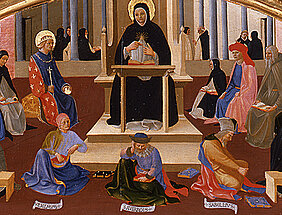As Europe turned its back on Arabs
01/16/2017During the Renaissance, the Europeans began to supplant the Arabic roots of their culture: This is the gist of Dag Nikolaus Hasse's new book (Harvard University Press). Hasse is a professor of philosophy.

During the Renaissance in the 15th and 16th century, art and culture increasingly turned towards the ancient Greeks and Romans. At the same time, the Renaissance marked a turning point in Euro-Arab relations. Professor Dag Nikolaus Hasse from the Julius-Maximilians-Universität (JMU) Würzburg n Bavaria, Germany, describes this process in his new book.
Researchers frequently assume that the people of the Renaissance had little interest in Arabic science and philosophy. In his book published in English, however, Hasse demonstrates that this was not the case.
Booming interest in Arabic works
On the one hand, the influence of Arab traditions such as pharmacology, astrology or theory of intellect peaked during the Renaissance. The epoch saw a virtual boom in Latin new translations and new editions of Arabic works such as Avicenna's Cannon of Medicine or Averroes' Commentaries on Aristotle.
Moreover, lots of Renaissance scholars adopted Arab ideas in the fields of medicine, astrology and philosophy. They even defended these ideas against critics.
Arabic roots suppressed deliberately
"On the other hand, people began to forget or even to reject the Arabic roots of European culture deliberately during this period," Hasse says. In line with a radical interpretation of humanism, Arab authors were deliberately replaced by Greek authorities in the curricula of European universities.
This process was accompanied by harsh polemics. For instance, Arab scientists were wrongly accused of being enemies of religion, plagiarists and of corrupting language.
But the polemics was not just ideological: The humanists were language experts and as such they were able for the first time to identify deficits in scientific Arab texts which had been caused by incorrect translation and handing-down errors.
A combination of ideological and scientific motives
In his book, the Würzburg professor demonstrates how a mixture of ideological and scientific motives caused some Arabic traditions to almost disappear in European culture, whereas others continued to thrive.
Averroes' theory on intellect, for example, was attacked as being anti-religious and non-Greek, but still had supporters who argued cleverly. It was not before the mid-16th century that it was replaced by rivalling philosophical theories.
Dag Nikolaus Hasse: “Success and Suppression. Arabic Sciences and Philosophy in the Renaissance”, Harvard University Press 2016, 688 pages, 54 euros, ISBN 9780674971585.
Information about the author
Dag Nikolaus Hasse is a professor at the Institute of Philosophy of the JMU. His research activities focus on the Arabic history of philosophy and science, the Arabic influence in Europe from a historical perspective and the European history of philosophy and science of the 12th to 16th century.
In his studies Hasse showed among others how intensive and fruitful the culture exchange between scholars and institutions from the Orient and the Occident had been. He links historical-philological research with new, self-developed analytical methods. Using philological and computer-based methods, he thus identified the linguistic characteristics of the individual translators of Arabic texts and reconstructed their role in the major schools of translators and their influence on the history of European sciences.
For his achievements in these fields, Hasse was awarded the Leibniz Prize of Deutsche Forschungsgemeinschaft in 2016. The prestigious award comes with EUR 2.5 million of research money.
Contact
Prof. Dr. Dag Nikolaus Hasse, Department of Philosophy III of the University of Würzburg, T +49 931 31-82778, dag-nikolaus.hasse@uni-wuerzburg.de






